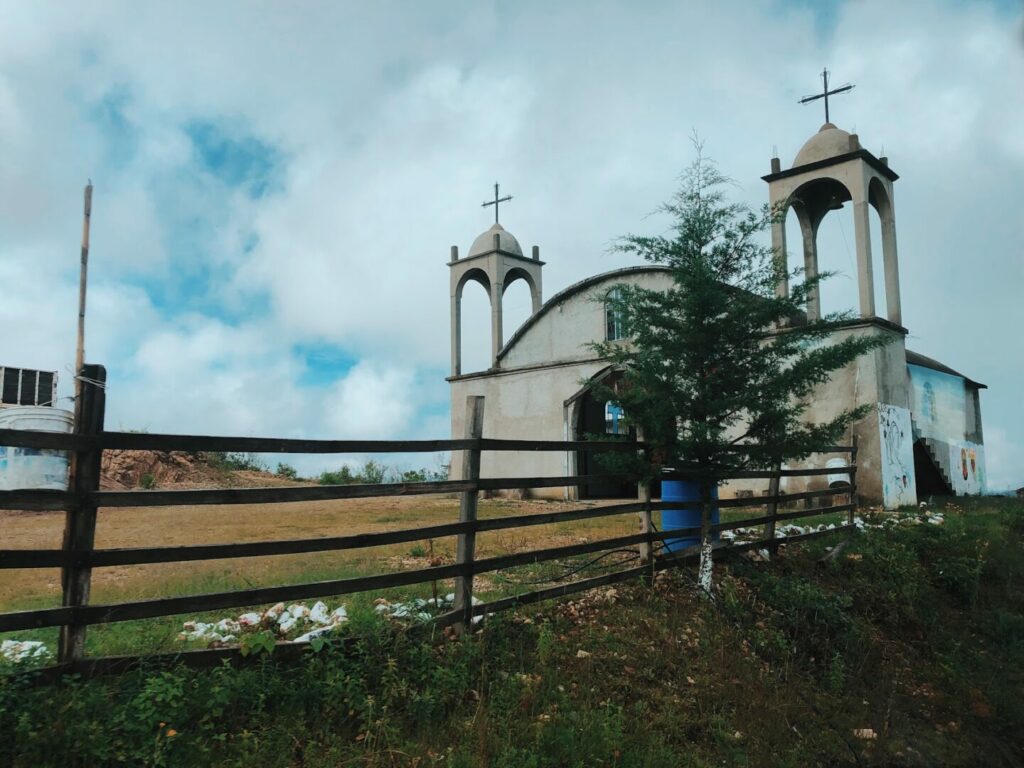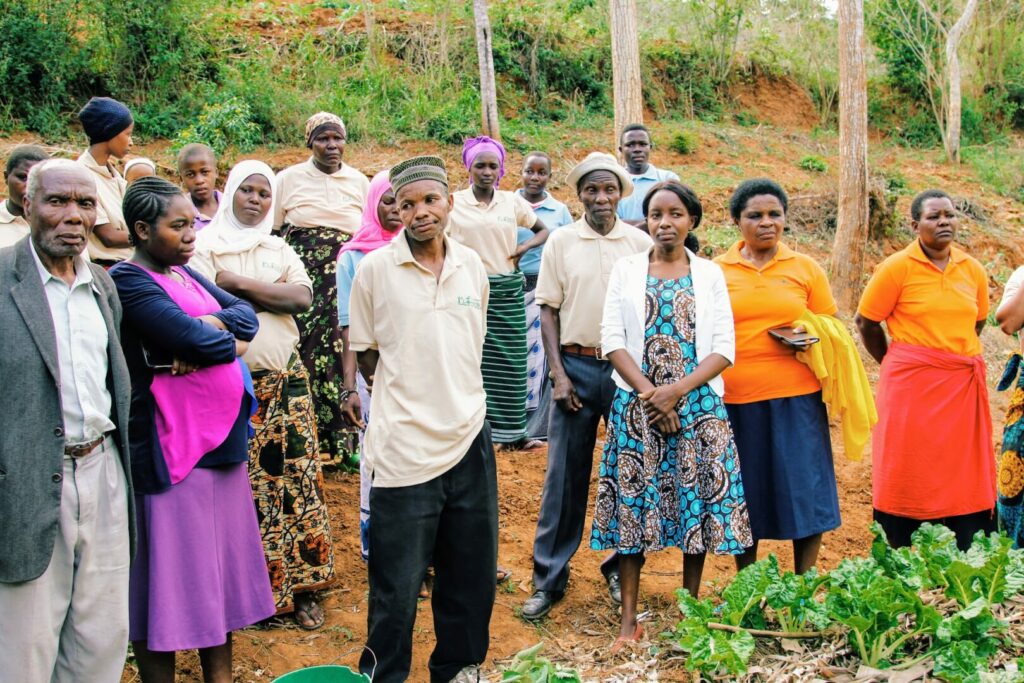Plant With Purpose’s mission encompasses a threefold approach. The three spheres of environmental restoration, economic empowerment, and spiritual renewal are integrated, leading to transformational change. While we believe strongly in the relationship between these areas, they each have unique nuances, especially the area of spiritual renewal. It is less tangible than environmental restoration, and it doesn’t lend itself to statistical measurement the way economic figures do. Yet, its importance to our work cannot be minimized. Spiritual renewal in the communities where we work is far more than a sentimental outcome, it truly drives and sustains the overall process of transformation.
Why Spiritual Renewal?
Part of the formula that makes our work effective is the synergy between economic empowerment, provided by savings groups, and the existing income opportunities each participant can build upon by improving their farming yields. Regenerative agriculture training, taught through Farmer Field Schools, helps farmers recognize the potential of investing time and money into their farm.
People often wonder where spiritual renewal fits within that cycle. Some have even gone so far as to refer to it as a “bolt-on” addition that has little to do with the rest of our work. That impression is perhaps reinforced by the fact that faith-related activities are not obligatory for participants. Our team reaches out in love, serving everyone, regardless of their belief. We don’t require anyone to sit through a sermon, participate in a Bible study, or attend church. We want to offer people the opportunity, but not the obligation, to learn about the hope we have in Jesus, and we want to ensure that is done with gentleness and respect.
However, as interested members participate, it becomes the “secret sauce” that really transforms individuals, groups, and entire regions. Participants and nonparticipants alike benefit from a renewed sense of personal value, purpose, unity, and restoration of neighborly relationships in a community. In addition to the eternal consequences of spiritual renewal, there are overwhelming practical impacts of this facet of our work.

Partnership With Churches
The majority of the places where we work are at least nominally Christian, and much of our outreach happens through partnership with local churches. The description of these churches varies widely across our global program, from tiny churches made up of a few families led by a pastor with almost no formal training, to larger churches led by circuit pastors whom the congregation might see only once every month or two. There are even a few surprisingly big churches in some of the larger towns. (I once visited a church in Burundi with a massive stone sanctuary, which they had outgrown. As I talked with their multi-person pastoral team, I witnessed hundreds of members of the congregation, each carrying large stones, voluntarily participating in the construction of an even larger sanctuary.)
The nearly one thousand church partnerships our team nurtures across the globe include a diverse set of spiritual communities. We work closely with their leaders, equipping them and empowering them in their mission to serve their own communities, and they also support our work by providing immediate credibility for our presence in those communities. One of the reasons this partnership works is that we are not in competition with churches. We provide them with tools they may be missing, such as devotional materials, while the teaching we share complements their theology and offers an opportunity to apply it in daily work and life. That allows us to work with an incredibly wide variety of denominations.
Impact of the Church in the Community
Through our curriculum, church leaders are taught more about their calling to be salt and light to their communities: to care for the widow, the orphan, and the stranger in their midst. They are encouraged to consider the needs of their neighbors and turn outward to meet those. This has not only contributed directly to church growth, but it has also resulted in a wide variety of church-led initiatives which would otherwise fall outside the scope of our own immediate work. Literacy classes have been started, church land has been dedicated to feeding the poor, and housing has been provided for those lacking homes. A couple of years ago, a dozen local churches in the eastern Congo worked together to provide care for a large influx of refugees into their watershed. The pastors involved shared that this was a dramatic change for the region. Previously, they never would have cooperated, much less taken this on. Instead, they would have considered it a nuisance and a problem for the government to deal with.
Plant With Purpose Tanzania’s Director, Richard Mhina, recently shared how churches have effectively become our ambassadors, encouraging their members to get involved with development work and allowing our participants to share during their services. This type of endorsement often makes expansion into new communities and watersheds far smoother. When we recently expanded into five new watersheds in eastern Congo, our local program manager, Birori Gaparani, told me that church and community leaders were already waiting for us to arrive, eager to get started and ready to work.

Identity in Christ, Theology of Work, and Care of Creation
The synergy between farming, savings, and spiritual growth goes beyond collaboration with churches. We offer a curriculum that helps people to understand their importance in God’s eyes, to realize the value of their work, and to appreciate their role in loving their neighbor and caring for God’s creation.
Subsistence farmers are among the most disempowered people in the world, both materially and psychologically. Often living on less than a dollar a day and growing most of their own food, their daily lived experience often conveys or reinforces a sense of worthlessness. The economy typically doesn’t value anything they produce, many leaders believe them to be a barrier to progress, and the media often neglects their concerns. Sometimes even their own families look down on rural lifestyles. Nonprofit agencies can further reinforce this. Some environmental NGOs only see smallholder farmers in terms of destructive land practices or development programs, which prioritize getting farmers off the farm as a misguided route to economic growth.
However, as farmers begin to discover or reconnect with their identity as people created in God’s own image with unique talents, and are given the privilege of participating alongside Jesus in his redemptive work in the world, the change in attitude is remarkable. Each of us has a role to play, a purpose. Self-confidence and hope replace helplessness and discouragement. This is reinforced by practical success on the farm. That self-confidence and hope is directly invested back into savings groups.
Regenerative agriculture training, which is foundational to farming success, is a helpful reflection of a Christian approach to care of creation. God placed Adam in the Garden to tend it and to keep it, and farmers are fulfilling this God-given role every day. They learn that they have been called to be stewards of the Earth, and not only does their land provide them with food and more money to save, but it also has meaning and importance in God’s eyes. Many of the local churches focus solely on preaching salvation, leaving few ways for most people to contribute, unless they are pastors. Our creation care teaching lets people know that their work on the farm is more than mere subsistence, it is a meaningful way to invest their talents on behalf of God’s kingdom. People are finding purpose in restoring their own watersheds. They aren’t just planting; they are planting with purpose.
Richard shared that this has made the work ethic of Plant With Purpose participants measurably different than that of their neighbors. Durbel, Plant With Purpose Dominican Republic’s Director, goes so far as to say that the change in attitude and outlook is absolutely fundamental to the physical changes which are easier measure. He goes on to say how impressive it is that God has changed the attitudes, not just of one person or a few, but of thousands who used to say, “I can’t,” and now say, “we can.”



















Thank you for this comprehensive and informative explanation of how spiritual renewal fits the Plant with Purpose restoration model. It is inspiring to hear how creation care, relationship building and church renewal become the pathway forward for communities committed to each other, their lands and to their Lord.
Truly the “secret sauce” in all that you do. I so appreciate your being bold in stating that. Well done!
I really appreciate this explanation of the Christian roots that nourish Plant With Purpose's work. I think there could be a number of potential supporters who would be curious about, or even dismiss the spiritual foundation of our programs as unnecessary. Here are some good answers to these inquiries.